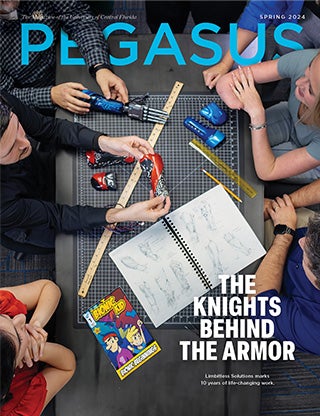In September 2018, Amazon released its third generation of the Echo Dot. For millions of consumers, it instantly became yet another connection into their personal smart hubs known as “the internet of things.” Smartphones. Smart speakers. Smart TVs. Smart car entertainment systems. Smart dolls. We didn’t forget you, laptops and tablets. All of these smarts creating a massive cloud of instant information.
“What I saw [at UCF] is a future powerhouse university in the cybersecurity field. I wanted to be a part of realizing it.”
— Yan Solihin, professor of computer science
Not everyone was completely enamored.
Earlier in that same year, Yan Solihin had come to UCF as the director of cybersecurity and privacy, and to lead the university’s cybersecurity cluster. Solihin had dedicated his career to the cyber race — people with good intentions trying to stay two steps ahead of “the other people.” Whenever he saw a new smart device introduced to the marketplace, he saw something else: another potential cyber gap.
“You can set up a computer with antivirus software and a firewall,” says Solihin, “but now a smart refrigerator could be the vulnerable point for an attacker to target.”
And that begins to explain the reason behind Solihin’s decision to leave his position as program director of the Secure and Trustworthy Cyberspace (SaTC) program at the National Science Foundation (NSF).
“I saw a need to ramp up the cybersecurity capabilities in the U.S., specifically the supply of talent,” says Solihin. “The supply has lagged behind the demand. So I asked myself, ‘Where can I achieve this? Where can I contribute to the future workforce in cybersecurity?’”
Solihin had read about UCF’s advancements in cybersecurity research and academia, and its national success in cyberdefense competitions. He also heard of the school’s commitment to invest in cybersecurity research, education, training, talent development, and to expand its collaboration with tech companies. During a visit to determine if this is the place where he could make a difference, he toured Central Florida Research Park and saw defense companies and government entities just around the corner from UCF’s computer science labs and the Institute for Modeling and Simulation. Faculty members told him about graduates, with a variety of degrees, doing cybersecurity work for giants like Raytheon, Lockheed Martin, Google, Amazon, Instagram, even for UCF.
“What I saw then,” says Solihin, “is a future powerhouse university in the cybersecurity field. I wanted to be a part of realizing it.”
A Cyberdefense Powerhouse
The supply-demand gap that originally grabbed Solihin’s attention is now more vivid than ever. According to the U.S. Department of Labor, more than 112,000 jobs were available for information security analysts in 2019 and the field is forecast to grow 32 percent by 2028.
Cyberdegreesedu.org ranked UCF among the top 30 colleges for cybersecurity programs in the U.S. — above Florida State, Cornell, Clemson, George Washington and Northwestern.
“We’ve made significant advancements just since I’ve been here,” says Solihin. For example:
- Earlier this year, cyberdegreesedu.org ranked UCF among the top 30 colleges for cybersecurity programs in the U.S., above schools such as Florida State, Cornell, Clemson, George Washington and Northwestern.
- In February 2019, UCF opened the new state-of-the-art Lockheed Martin Cyber Innovation Lab.
- Over the past two years the university’s cybersecurity and privacy cluster has secured $10 million in funding for its research. The funding has been awarded from government agencies such as NSF, the Office of Naval Research, Defense Advanced Research Projects Agency, the Army’s Program Executive Office for Simulation, Training and Instrumentation (PEO STRI), and Cyber Florida, as well as from industry partners such as Intel and Sophos.
- The nine professors in the cybersecurity cluster are now advising 45 Ph.D. students, four master’s degree students and 17 undergraduates, all of them bridging the disciplines of computer science, engineering, business and psychology to come up with real-world answers to cyber dangers. As Solihin says, “We cannot be confined to our individual toolboxes if we’re going to make meaningful advancements in dealing with important societal problems in cybersecurity.”
- Despite no specific bachelor’s degree in cybersecurity, UCF offers a minor in secure computing and networks, a master’s in digital forensics and a graduate certificate in modeling and simulation of behavioral cybersecurity — all three covering the timeliest topics in cybersecurity. And brings in guest lecturers, such as Amit Kapadia, product manager for cyber resiliency and the training chief engineer at PEO STRI, who spoke to students in the Emerging Cyber Issues class on June 30.
- The school recently announced a graduate certificate in cyber risk management while an official master’s degree in cybersecurity moves through the pipeline for approval.
- The presence of defense, business and government entities in Research Park continually opens doors to internships and job placement.
“What we have,” says Solihin, “is a 20-year history of well-trained students going into cybersecurity careers. It’s a success that separates UCF.”
A Top-Ranked Collegiate Cyberdefense Team
Like the cyber field itself, the cybersecurity talent coming out of ������ϲʿ������ flew somewhat under the radar through the early 2000s. Then, in the fall of 2012, a student posed a question to Tom Nedorost ’02MS, who was in his first year as a computer science instructor at UCF.
“We have a wealth of highly-skilled students at UCF with a tremendous passion for the good side of cybersecurity.”
— Tom Nedorost ’02MS, faculty advisor for UCF’s collegiate cyberdefense Teams
“The student asked if I’d help form a team to enter a cyber competition,” Nedorost says. The criteria said each school needed eight team members and four alternates. “I told the student he’d need 11 friends just like him, and didn’t think much more of it.”
The student sent out an email about a meeting to gauge interest in the competition. Three days later Nedorost walked into the room with mild hopes of 12 students being there. He was floored to see 86 students waiting to hear more.
“It proved to me,” says Nedorost, “that we have a wealth of highly-skilled students at UCF with a tremendous passion for the good side of cybersecurity.”
The meeting launched what may have been long overdue: a cybersecurity club, called . Just six months after being formed, the 12-student team representing Hack@������ϲʿ������ finished 10th at the National Collegiate Cyber Defense Competition. A year later, in a field of 180 colleges and universities, the team won the first of its three straight national championships.
Nedorost and Solihin both say UCF’s large pool of students (more than 3,000 computer science undergraduates and as many as 300 members in Hack@UCF) is a factor in UCF’s track record of turning out so much cybersecurity talent. But there’s more to it than numbers. The success of the club is an outgrowth of the collaborative academic culture at UCF — a mutual desire to stay ahead.
“Our mix of specialties and perspectives gives us an important edge,” says Nedorost. “We have honor-roll students majoring in engineering being pushed by students who might barely be above probation status. They’re all incredibly smart. They challenge each other every day, which is a direct reflection of the real cyber world. We need all of them.”
Or, as Solihin has been saying all along: We need more of them. More smart people protecting our smart world.





